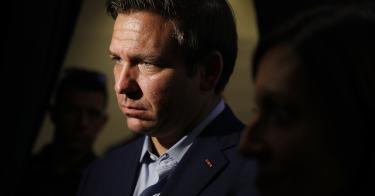This past summer has been one of unrest, and unfortunately, one of lawlessness as looters and rioters have co-opted and supplanted protests in cities around the country.
And it’s been exacerbated by the fact that some prosecutors in many of these cities have abdicated their responsibilities to enforce the laws, helping to fuel the surge in violence with their dangerous and misguided policies.
For example, police officials have forcefully argued that the lax bail policies promoted by many of these prosecutors, such as presumptive release on personal recognizance even for many violent offenders, have fueled a surge in violent crime and have allowed the same individuals to wreak havoc night after night. Look at Boston, Chicago, and San Francisco, where residents are concerned about the spike in crime, and Portland, where nightly—often violent—demonstrations have consumed the city.
It’s easy to think of these cities and their problems as being far away from many of us—different places, different people, different problems.
But they’re not. These same problems can happen anywhere lawlessness is allowed to fester. Florida’s governor, Ron DeSantis, recognized this and put forward a plan with proposed legislation.
Unlike other states, such as Virginia, which have sought to eliminate mandatory minimum sentences for assaulting law-enforcement officers, DeSantis has pledged a mandatory minimum sentence of at least 6 months imprisonment for striking a law-enforcement officer during a violent or disorderly assembly.
Good.
Also in an effort to keep the same individuals from wreaking havoc night after night, the proposal suggests that “No bond or bail [shall be provided] until [a] first appearance in court if charged with a crime related to participating in a violent or disorderly assembly.” It goes on to say that there will be a “rebuttable presumption against bond or bail after [a] first appearance.”
A rebuttable presumption against bail, in which a court presumes something is the case until evidence proves otherwise, isn’t some far-fetched draconian proposal. Federal bail law, for instance, currently provides for rebuttable presumptions in certain instances, and as a Congressional Research Service Report made clear, “the prosecution [still] bears the ultimate burden of establishing that no series of conditions is sufficient to negate the risk of the accused’s flight or dangerousness.” To assuage any fears of this new proposed provision being abused, the state could adopt similar safeguards.
Of course, the legislative text is undoubtedly still a work in progress, and the current draft does not include all of DeSantis’s proposals, so it will be important to scrutinize the details of the law as it works its way through the legislative process. It will also be important for legislators to include adequate mens rea provisions—that is, require sufficient intent or guilty state of mind—when enacting the new criminal provisions.
Legislators will also need to carefully craft the proposed new offense making it illegal to harass someone in public accommodations, such as restaurants.
While the images from this summer of innocent diners being accosted by menacing crowds and berated and threatened unless they engaged in some type of ritual to “show support” for the cause rightfully horrifies many of us, the proposed new crime, unless carefully crafted, might sweep too far, scooping up constitutionally protected activity too. Since many of the disturbing acts this new law seeks to target could already be violations of other existing criminal laws (such as assault or trespass), legislators might consider simply enhancing the penalties if they are committed in certain specified instances.
Of course, the usual suspects have come out strongly opposed to these measures. The ACLU of Florida condemned the measures as “undemocratic and hostile to Americans' shared values,” saying the “effort has one goal: to silence, criminalize, and penalize Floridians who want to see justice for Black lives lost to racialized violence and brutality at the hands of law enforcement.”
Well, that’s not true. Peaceful protests are permissible and encouraged—violent ones are not. While work still needs to be done to ensure these measures appropriately tackle the problems they seek to solve, it’s an encouraging first step to see that the governor and other state officials take the safety and security of their citizens seriously.
This piece originally appeared in the Orlando Sentinel




